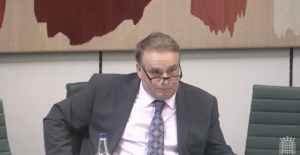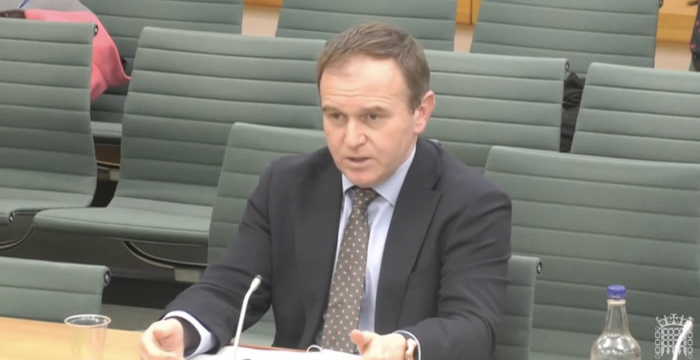Defra Secretary George Eustice has told a committee of MPs that the Government is ‘limited’ in what it can do to support pig producers during their time of crisis.
Instead, Mr Eustice put the onus very much on pork processors to do more to increase their throughput and reduce the backlog on farms, at one point appearing to suggest this should include paying farmers less to speed up the process of getting pigs through plants.
However, while he offered little prospect of any short-term Government help for the industry, Mr Eustice reiterated that Defra is looking to introduce new legislation in the future to ensure a more functional and fairer pig supply chain.
Mr Eustice was questioned on the pig crisis by Environment, Food and Rural Affairs (EFRA) Committee chairman Neil Parish and other MPs at the end of a long and wide-ranging session on Tuesday covering his and Defra’s work.
‘Sheer waste of food’
Mr Parish quoted a Yorkshire pig farmer, who had told him pigs are being culled on her farm ‘as we speak’, as the impact of pigs being held on farm for longer due to processing delays takes its toll. “There are animal welfare issues of this and it’s a sheer waste of food,” Mr Parish said, before asking the Defra Secretary what more could be done to get pigs ‘properly processed and the animal welfare issues solved’.
Mr Eustice acknowledged that the situation was ‘quite difficult’, but went on to explain how the industry’s ‘asks’ that the Government had delivered in its October support package had not been utilised by processors.
The ‘bespoke’ temporary visa scheme for pigs that was delivered despite being a departure from Government policy ‘hasn’t been used as much as we’d hoped’, he said. “There was a provision for about 800, but I think it will be in the low hundreds for the numbers that they actually bring in under that scheme.
“Some of the processors have used the skilled route to bring some butchers in from some areas, but they’ve not they’ve not been recruiting in the way we thought they might, given the labour shortage was one of the key issues they kept highlighting.
He also highlighted the minimal uptake for the Private Storage Aid and Slaughter Incentive schemes, also announced in October.
Mr Eustice said Defra had hoped the processors would put on Saturday slaughter days to clear the backlog, suggesting they could have ‘dropped the price of pigs to just clear the backlog and put them on the open market in markets like the European Union, unprocessed on unbutchered’.
“They haven’t generally done that to the extent that we would that we would like. So, there are things that government has tried to do and offer them what they wanted, but we need those processors to try and do their bit as well,” he said.
Industry summit?

Mr Parish intervened to press Mr Eustice on what he intended to help pig farmers, rather than focusing entirely on processors including whether he was going to meet with pig farmers and the wider supply chain to try and thrash out solutions, as the NPA, backed by the NFU, has been requesting for some time.
Mr Eustice said he was ‘always of course willing to meet people’ and pointed out that Farming Minister Victoria Prentis had met the NPA ‘on several occasions’, but gave no firm commitment on the summit, despite being pressed on the issue again.
He reverted to this theme of calling for processors to do more. “There is a limit to what we can do short of buying an abattoir ourselves and doing it all ourselves as a government. In a private market like this, we do need those processors to do their bit to try and help clear the backlog.
“What we really needed them to do was to start running Saturday culls, to use the private storage aid scheme, to reduce the payment that they’re paying farmers for pigs just to help them clear the backlog and to get through this.
“I think industry, as well as talking to ourselves, should be talking to those processors because those processors have got a responsibility to the farmers that are contracted to.”
Regulatory powers
When questioned by Mr Parish again on whether he also had a responsibility to the farmers, the Defra Secretary reiterated the Government’s intention to use its the powers under the Agriculture Act to introduce new regulatory requirements on contracts in the pig supply chain.
“It may be that one of the lessons from this is that the Government needs to come in with a statutory requirement on how the major pork processors should behave,” Mr Eustice said.
He was unable to shed much light on requests from MPs to clarify the number of pigs that have been culled on farm and the size of the backlog, agreeing the number was probably something like the NPA’s estimate of 35,000 pigs, but added:
“You have to put that in the context of the millions of pigs that are slaughtered each month, so it’s a relatively small percentage overall but that’s not to say that there isn’t a really severe problem with pigs that are now overgrown, oversized and out of specification in some cases.”
EFRA Committee member Neil Hudson raised the animal health and welfare issues and impacts on human mental health of the industry crisis, and sought assurances the entire Government, not just Defra, was ‘still on it’, because, he added, ‘we are very concerned across the committee at a potential catastrophe coming again’.
Mr Eustice said the Home Office had helped with the visa situation, and the Foreign Office was working on market access, including trying to get lost China export licences reinstated.
- You can view the hearing HERE – the pig crisis is discussed from 16.48.




